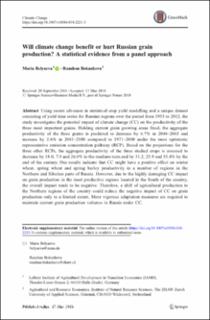Bitte benutzen Sie diese Kennung, um auf die Ressource zu verweisen:
https://doi.org/10.21256/zhaw-3828| Publikationstyp: | Beitrag in wissenschaftlicher Zeitschrift |
| Art der Begutachtung: | Peer review (Publikation) |
| Titel: | Will climate change benefit or hurt Russian grain production? A statistical evidence from a panel approach |
| Autor/-in: | Belyaeva, Maria Bokusheva, Raushan |
| DOI: | 10.21256/zhaw-3828 10.1007/s10584-018-2221-3 |
| Erschienen in: | Climatic Change |
| Band(Heft): | 149 |
| Heft: | 2 |
| Erscheinungsdatum: | 27-Mai-2018 |
| Verlag / Hrsg. Institution: | Springer |
| ISSN: | 0165-0009 1573-1480 |
| Andere Identifier: | http://hdl.handle.net/10419/155773 |
| Sprache: | Englisch |
| Fachgebiet (DDC): | 630: Landwirtschaft |
| Zusammenfassung: | Using recent advances in statistical crop yield modelling and a unique dataset consisting of yield time series for Russian regions over the period from 1955 to 2012, the study investigates the potential impact of climate change (CC) on the productivity of the three most important grains. Holding current grain growing areas fixed, the aggregate productivity of the three grains is predicted to decrease by 6.7% in 2046–2065 and increase by 2.6% in 2081–2100 compared to 1971–2000 under the most optimistic representative emission concentration pathway (RCP). Based on the projections for the three other RCPs, the aggregate productivity of the three studied crops is assessed to decrease by 18.0, 7.9 and 26.0% in the medium term and by 31.2, 25.9 and 55.4% by the end of the century. Our results indicate that CC might have a positive effect on winter wheat, spring wheat and spring barley productivity in a number of regions in the Northern and Siberian parts of Russia. However, due to the highly damaging CC impact on grain production in the most productive regions located in the South of the country, the overall impact tends to be negative. Therefore, a shift of agricultural production to the Northern regions of the country could reduce the negative impact of CC on grain production only to a limited extent. More vigorous adaptation measures are required to maintain current grain production volumes in Russia under CC. |
| Weitere Angaben: | Erworben im Rahmen der Schweizer Nationallizenzen (http://www.nationallizenzen.ch) |
| URI: | https://digitalcollection.zhaw.ch/handle/11475/7576 |
| Volltext Version: | Publizierte Version |
| Lizenz (gemäss Verlagsvertrag): | Lizenz gemäss Verlagsvertrag |
| Gesperrt bis: | 2023-06-01 |
| Departement: | Life Sciences und Facility Management |
| Organisationseinheit: | Institut für Umwelt und Natürliche Ressourcen (IUNR) |
| Enthalten in den Sammlungen: | Publikationen Life Sciences und Facility Management |
Dateien zu dieser Ressource:
| Datei | Beschreibung | Größe | Format | |
|---|---|---|---|---|
| Belyaeva-Bokusheva2018_Article_WillClimateChangeBenefitOrHurt.pdf | 1.67 MB | Adobe PDF |  Öffnen/Anzeigen |
Zur Langanzeige
Belyaeva, M., & Bokusheva, R. (2018). Will climate change benefit or hurt Russian grain production? A statistical evidence from a panel approach. Climatic Change, 149(2). https://doi.org/10.21256/zhaw-3828
Belyaeva, M. and Bokusheva, R. (2018) ‘Will climate change benefit or hurt Russian grain production? A statistical evidence from a panel approach’, Climatic Change, 149(2). Available at: https://doi.org/10.21256/zhaw-3828.
M. Belyaeva and R. Bokusheva, “Will climate change benefit or hurt Russian grain production? A statistical evidence from a panel approach,” Climatic Change, vol. 149, no. 2, May 2018, doi: 10.21256/zhaw-3828.
BELYAEVA, Maria und Raushan BOKUSHEVA, 2018. Will climate change benefit or hurt Russian grain production? A statistical evidence from a panel approach. Climatic Change. 27 Mai 2018. Bd. 149, Nr. 2. DOI 10.21256/zhaw-3828
Belyaeva, Maria, and Raushan Bokusheva. 2018. “Will Climate Change Benefit or Hurt Russian Grain Production? A Statistical Evidence from a Panel Approach.” Climatic Change 149 (2). https://doi.org/10.21256/zhaw-3828.
Belyaeva, Maria, and Raushan Bokusheva. “Will Climate Change Benefit or Hurt Russian Grain Production? A Statistical Evidence from a Panel Approach.” Climatic Change, vol. 149, no. 2, May 2018, https://doi.org/10.21256/zhaw-3828.
Alle Ressourcen in diesem Repository sind urheberrechtlich geschützt, soweit nicht anderweitig angezeigt.